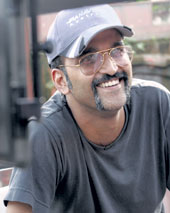 |
Rohan Sippy isn’t worrying about what the critics say. His latest film, Bluffmaster, has just hit the screens and director Sippy is keeping his fingers crossed. But he insists that his second movie is a step forward for him as a filmmaker and that’s more important than anything else. “For me the box office pressure had not mattered much. Of course, I wanted the film to be liked by people. But more than that, I hope on the creative level, I have pushed it one notch higher than Kuch Na Kaho,” he says.
It helps that Bluffmaster stars his best friend Abhishek Bachchan and another star who’s zooming to the top, Priyanka Chopra. The movie is about Roy, a super-cool suave gent played by Abhishek Bachchan who tries all kinds of tricks to con people. When Priyanka Chopra (Simmi), who plays Abhishek’s love interest comes to know of his tricks, their engagement is called off and trouble begins in paradise. The film has been shot entirely in Mumbai and its landscape, people, energy and confusion are beautifully woven into the film.
Why Abhishek? No, says Rohan. It wasn’t because they are best friends. “I could not think of anybody else to do this character. His smart and suave look also suited this role perfectly. He has the ability to use his body, his voice and eyes to portray the character of Roy.” Another high point of the film was making Abhishek sing a rap song composed by Vishal-Shekhar called Sabse Bada Rupaiya which has already topped the musical charts.
So what makes Bluffmaster different? According to Rohan, it’s the packaging and fast pace of the film. The context of his film is very urban and contemporary. His frames are peopled with characters who are identifiable in all their follies and frailties. Moreover, writer Sridhar Raghavan’s screenplay and Himman Dhamija’s camera movements make the movie smart and entertaining. The movie was made for Rs 9 crore and has been produced by Ramesh Sippy Entertainment.
Rohan made his debut as a director in 2003 when he made Kuch Na Kaho with Abhishek Bachchan and Aishwarya Rai. Despite its star cast, the film didn’t do well at the box-office. Written by Rohan’s wife Rohena Gera, it dealt with an unusual issue, by Bollywood standards — single mothers. “I believe the story didn’t work out, otherwise I didn’t see any reason of it failing at the box office,” he says defensively.
Returning to Bollywood wasn’t an automatic choice for Rohan who studied in Switzerland and picked up a degree in philosophy from Stanford. “I wanted sound credentials before I stepped into this line,” he says. But he was always enraptured by the movies and even as a child used to watch four or five films a week. Movies made by his father Ramesh Sippy were, of course, hot favourites. His favourite star was Amitabh Bachchan. But Rohan wants to carve out his own path in the industry. His father made movies like Sholay, Shakti and Shaan but Rohan is hoping to make films that will appeal to a new generation. “I have grown up on a good dose of Hindi films and like any other teenager was quite in awe of the film Sholay,” he says. Nevertheless, Rohan took his first steps in the industry with his father’s help. He assisted him in the movie
Zamana Diwana. Predictably, however, Rohan insists that being from the Sippy family has its advantages and disadvantages. “The good part is that people already know you in the industry and so getting a foothold wouldn’t be a problem. But the biggest disadvantage is that there is a huge expectation every time you come out with a film,” he laughs.
Inevitably, the new generation borrows freely from the latest trends abroad. Rohan has an eclectic taste in movies and cinematic styles. And although global styles and techniques have inspired his sensibilities, he does not deny the strength of a
typical Bollywood film. “It all depends on how you present your characters. You
may narrate the same story but it’s the depiction which matters the most today,”
he adds.
He also believes that with films like Lagaan getting nominated in the Oscars, there’s hope for Indian cinema abroad. “It’s heartening to note that boundaries are shrinking and now our films are being accepted abroad,” he says. But as much as Bluffmaster’s success means to the ambitious young director, he is already looking beyond it.
Eager to explore newer horizons, Rohan is now working hard on scripts and developing a screenplay. As for his next project, though nothing has been finalised as yet, he’s toying with making a film from Chetan Bhagat’s bestselling book One Night At A Call Centre. He reckons it’s a contemporary subject that will appeal to youngsters. He’s looking at how to turn the book into a movie screenplay.
But he hates the idea of making a remake of a film like Sholay. Ask him whether he will attempt a remake of his father’s classic and pat comes the reply, “I can’t think about a
second Sholay or a Shaan. I am comfortable making the kind of movies I believe in,” he says. Between films, Rohan likes to spend time discussing films, reading and a bit of travelling. For the moment though, he is focusing on rising to the top in the tough dog-eat-dog world of Bollywood.











